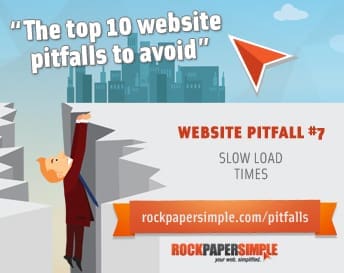 Phew… we are seven pitfalls in! Didn’t think I had the stamina to make it this far, did you? That’s right, I’m a blog writing machine!
Phew… we are seven pitfalls in! Didn’t think I had the stamina to make it this far, did you? That’s right, I’m a blog writing machine!
Okay, so I’m not actually a blog writing machine… in fact, I’m not really a machine at all. I’m a human being with feelings and… oh, sorry, I got off topic. What was it I was saying, again? Oh yea! Pitfalls! Let’s chat about #7!
We can all relate to this one. Does the following scenario sound familiar?
“Aha, that looks cool, I think I’ll click on that….”
(five seconds later)
“I’ve been waiting YEARS for this site to load, I give up!”
I can’t count the amount of times I’ve hit the back button because a website or blog post or image or comment box took too long to load. We just don’t have the attention span or time to wait for things to load anymore and neither does your visitor, prospect or client!
When a page loads slowly it wreaks havoc with its productivity, traffic, conversions and stunts any kind of growth it has. No matter how awesome your website is, it will never reach its potential if it takes eons to load.
I still remember when we began production on Space Coast Daily, one of our particularly large projects, the client said “… and it has got to run like a gazelle!” I later Googled gazelles and sure enough, they are pretty darn fast (50-60mph!), so we went to work and made sure the thing was fast. To this day, years later, when we make updates to that site we remind each other of that statement. (which is totally a great time for some shameless self promotion… if you are looking for a gazelle-fast website in Melbourne FL, guess who does that!?)
So how do you avoid the long load time issue? Easy! Pay us millions of dollars to fix it! Okay, okay… I’m kidding. There are a bunch of things you can check on your own or have your developer check on. Here are a few to get you started.
Optimize your images! Check to see if there are any really big images that can be reduced in size or optimized. Sometimes I see websites that have a 200×100 image on the site that is actually a 5000×2500 image that is just being resized with HTML or CSS. You, know what I’m talking about… that image, that when you click on it, blows up so big that all you see is a big eyeball on your screen instead of the whole portrait!? So much load time can be saved by resizing the image in an image editor like Photoshop or GIMP.
Your images can be further optimized by making sure you use the right file type. Images with flat illustrations or artwork are best as PNG and images with lots of colors like photos are best as JPG.
Once you’ve resized it and done some optimizations, you can also run it through Yahoo’s Smush.it to get it even smaller.
Look for JavaScript Errors or Unnecessary JavaScript. Sometimes a site has lots of JavaScript running to accomplish simple things that really don’t need it. Sometimes it’s still there from features or plugins that have been removed and is just eating up load time.
If it doesn’t help your website, kill it. Remove it. Delete it. Have no mercy! Send it back to the darkness from whence it came!!! (oops, sorry… I got a little excited)
Also, take a look and make sure there are no JS (that’s short for JavaScript) errors being thrown. That can slow you down too.
Remove slow queries. Queries are requests sent to the database for your website; that is, of course, if your website has a database and is powered by a content management system like WordPress, Joomla, Drupal, etc.
Sometimes a page loads really slowly because the code is taking a long time to ping the database and get all the content for the page. This is a hard one to track down, but it can be the downfall of many a website, especially once it starts getting lots of traffic and can even lead to server crashes. Sometimes you just have that demon (it’s evil I tell you) query that is wreaking havoc on an otherwise great website.
Make sure your hosting is good. Sometimes sites are just slow because the hosting is terrible. If you think this might be the case, contact your host and tell them your website is running slow. Ask them why. It can’t hurt. Sometimes they find a problem on their end and your site is back to being greased lightning!
Unfortunately, though, there are times to switch hosting and find a good provider that has good servers, support and can handle the traffic your website has.
Download our FREE eBook that includes the other 9 reasons!
[freebie id=”1423″]
